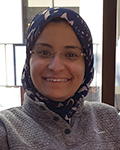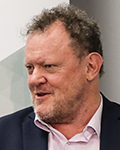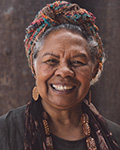

 Sondoss Elsawah is the Director of the Capability Systems Centre, a boundary organisation with the mission to connect science, engineering, policy, and industry to address complex societal problems. She is also an Associate Professor of Engineering at University of New South Wales Canberra. Sondoss’ career has been driven by the vision to advance and accelerate the science of knowledge integration and interdisciplinary problem-solving as key mechanism to drive innovative solutions to systemic problems and transformative change. To realise this vision, Sondoss has targeted her contributions towards progressing the field’s three pillars of research, practice, and education.
Sondoss Elsawah is the Director of the Capability Systems Centre, a boundary organisation with the mission to connect science, engineering, policy, and industry to address complex societal problems. She is also an Associate Professor of Engineering at University of New South Wales Canberra. Sondoss’ career has been driven by the vision to advance and accelerate the science of knowledge integration and interdisciplinary problem-solving as key mechanism to drive innovative solutions to systemic problems and transformative change. To realise this vision, Sondoss has targeted her contributions towards progressing the field’s three pillars of research, practice, and education.
Her research program focuses on the design and application of collaborative and model-based problem solving approaches to support decision making in complex and multi-stakeholder decision contexts. She has applied her research program in many critical and high impact application areas, such as sustainable development, national security, and emerging technologies. Examples include the design of decision support systems to inform the Australian Government on the acquisition of large-scale Defence investments.
Sondoss is a passionate educator who loves to stretch the mental models of her students to think in systems which extend beyond narrowly-defined and technically focused boundaries to more holistic view of the social, cultural, and ethical aspects. Her outstanding research and teaching have been recognised with several awards, including the Dorothy Green Award for Research Excellence. She is a Fellow of the Modelling and Simulation Society of Australian and NZ and the Peter Cullen Trust for leadership in bridging science-policy gap.
Sondoss is a mother of two beautiful children who continuously challenge her own mental model and personify the future generations as a key stakeholder for any societal problem and its solution.
 Simon Barry was the Digital Lead for the Environment business unit at CSIRO and focussed on driving innovation in the use of digital technologies to ensure Australia can navigate the challenges and opportunities the future presents as well as address the impacts and legacies of past actions. He was passionate about the opportunity that digital technologies present to transform the way we understand and manage our environment and natural resources. As Digital Lead he was committed to accelerating the uptake of new digital technologies across data collection, transmission, analysis and decision making as well as contributing to the debate about what Australia’s Environmental digital infrastructure could and should be.
Simon Barry was the Digital Lead for the Environment business unit at CSIRO and focussed on driving innovation in the use of digital technologies to ensure Australia can navigate the challenges and opportunities the future presents as well as address the impacts and legacies of past actions. He was passionate about the opportunity that digital technologies present to transform the way we understand and manage our environment and natural resources. As Digital Lead he was committed to accelerating the uptake of new digital technologies across data collection, transmission, analysis and decision making as well as contributing to the debate about what Australia’s Environmental digital infrastructure could and should be.
He had an extensive history using digital technologies and modelling and simulation to solve significant Australian challenges. He held significant senior roles at CSIRO over the previous 17 years including being Science and Deputy Director of Data61 and being the Research Director of the Analytics and Decision Sciences Program in Data61. Before this he was Senior Principal Research Scientist in the Department of Agriculture, Fisheries and Forestry in Canberra which pioneered the use of quantitative methods in complex decision making. He also worked at the Australian National University, the Australian Defence Force Academy and the Australian Bureau of Statistics.
Simon led significant innovation in the use of modelling and simulation across a range of major projects. Analytics projects include The New Atlas of Australian Birds which won a Eureka award in 2003 and the National Scale Land Use of Australia which was identified as an essential statistical asset for Australia. Modelling projects included significant work developing quantitative methods in biosecurity risk analysis, such as pioneering the science that underpins the International Maritime Organisations risk guidelines in the recently ratified International ballast water convention, as well as designing the Australia port surveillance system for honeybee pests. He also led the risk component of the Bioregional Assessment project, a pioneering project which assessed cumulative risks from conventional and non-conventional coal development across a number of major drainage basements in Australia.
Simon was an Honorary Professor at the ANU and outside of work kept busy tending his bees, orchids, and fish as well as cooking for family and friends.
 Dr Daniel P. Ames (Dan) is a Professor of Civil and Construction Engineering at Brigham Young University (BYU), which has a long history of advancing modelling and information science in the water resources domain. He teaches courses and conducts research in the fields of geomatics, hydroinformatics, spatial data analysis, programming, and related topics. He has over 20 years of experience in academia and industry and has supervised dozens of graduate students and research assistants. He is passionate about teaching and inspiring the next generation of engineers and scientists.
Dr Daniel P. Ames (Dan) is a Professor of Civil and Construction Engineering at Brigham Young University (BYU), which has a long history of advancing modelling and information science in the water resources domain. He teaches courses and conducts research in the fields of geomatics, hydroinformatics, spatial data analysis, programming, and related topics. He has over 20 years of experience in academia and industry and has supervised dozens of graduate students and research assistants. He is passionate about teaching and inspiring the next generation of engineers and scientists.
Dan is the Editor-in-Chief of the prestigious journal Environmental Modelling & Software and is a Fellow and past president of the International Environmental Modelling & Software Society (iEMSs). He is widely recognized as a leading expert in hydroinformatics and environmental modelling and has published over 80 peer-reviewed papers and book chapters on these topics. He has received several awards and honors for his teaching and research excellence, including the iEMSs Early Career Research Excellence Award, the ISU Distinguished Researcher, the and the BYU College of Engineering Outstanding Faculty Teaching Award. Dr. Ames is the founder of several open-source software projects, including MapWindow GIS, DotSpatial, HydroDesktop, and he helps lead and promote HydroLearn, HydroShare, and Tethys Platform. These projects aim to provide free and easy-to-use tools for spatial data analysis, hydrologic modelling, data sharing, online learning, and application development. He is currently involved in several projects that aim to improve water resources management and forecasting at various scales. He is collaborating with the US National Weather Service to enhance the US National Water Model with improved data access for actionable intelligence. He is also working with NASA, NOAA and the Group on Earth Observations (GEO) to develop and deploy a global streamflow forecasting service called GEOGloWS that provides near-real-time information on water availability and risks around the world.
Dan lives in Lehi, Utah, USA, with his wife and best friend, Emily. In his spare time, he enjoys spending time with their combined six children and one grandchild, as well as boating, enjoying the great outdoors, and exploring this wonderful world we share.
 Professor Anne Poelina, Co-Chair of Indigenous Studies Nulungu Institute Research, University of Notre Dame PhD, PhD, MEd, MPH&TM, MA, is a Nyikina Warrwa Indigenous woman from the Kimberley region of Western Australia. She is an active community leader, human and earth rights advocate, film maker and respected academic researcher, with a second Doctor of Philosophy (First Law) titled, ‘Martuwarra First Law Multi-Species Justice Declaration of Interdependence: Wellbeing of Land, Living Waters, and Indigenous Australian People’ (Nulungu Institute of Research, University of Notre Dame, Broome, Western Australia). Anne is the Murray Darling Basin (MDB) inaugural First Nations appointment to its independent Advisory Committee on Social, Economic and Environmental Sciences (2022), and member of Institute for Water Futures, Australian National University, Canberra. Poelina was awarded the Kailisa Budevi Earth and Environment Award, International Women’s Day (2022) recognition of her global standing. Poelina is also an Ambassador for the Western Australian State Natural Rangelands Management (NRM) (2022).
Professor Anne Poelina, Co-Chair of Indigenous Studies Nulungu Institute Research, University of Notre Dame PhD, PhD, MEd, MPH&TM, MA, is a Nyikina Warrwa Indigenous woman from the Kimberley region of Western Australia. She is an active community leader, human and earth rights advocate, film maker and respected academic researcher, with a second Doctor of Philosophy (First Law) titled, ‘Martuwarra First Law Multi-Species Justice Declaration of Interdependence: Wellbeing of Land, Living Waters, and Indigenous Australian People’ (Nulungu Institute of Research, University of Notre Dame, Broome, Western Australia). Anne is the Murray Darling Basin (MDB) inaugural First Nations appointment to its independent Advisory Committee on Social, Economic and Environmental Sciences (2022), and member of Institute for Water Futures, Australian National University, Canberra. Poelina was awarded the Kailisa Budevi Earth and Environment Award, International Women’s Day (2022) recognition of her global standing. Poelina is also an Ambassador for the Western Australian State Natural Rangelands Management (NRM) (2022).
As an Indigenous leader Poelina contributes towards National and Global Think Tanks. Poelina is an Adjunct Professor, College of Indigenous Education Futures, Arts & Society, Charles Darwin University, Darwin, Visiting Fellow with the Crawford School of Public Policy at the Australian National University, Canberra Australia Water Justice Hub with a focus on Indigenous Water Valuation and Resilient Decision making. As signatory to the Redstone Statement (2010) she helped draft at the 1st International Summit on Indigenous Environmental Philosophy. She is a 2011 Peter Cullen Fellow for Water Leadership. See www.annepoelina.com and www.martuwarra.org
 Associate Professor Avril Horne is a water policy specialist, with a rare combination of experience across economics, hydrology and policy. With twenty years' experience across a range of interdisciplinary projects, she has spent time in consulting, government and academia. As Assistant Director in the water group at the Australian Competition and Consumer Commission, she was heavily involved in the development of the water trading rules for the Murray Darling Basin Plan.
Associate Professor Avril Horne is a water policy specialist, with a rare combination of experience across economics, hydrology and policy. With twenty years' experience across a range of interdisciplinary projects, she has spent time in consulting, government and academia. As Assistant Director in the water group at the Australian Competition and Consumer Commission, she was heavily involved in the development of the water trading rules for the Murray Darling Basin Plan.
Avril returned to academia in 2014, and is currently working on projects that support adaptation and transformation under change and variability; allocation mechanisms and institutional arrangements for environmental water; and reallocation policies between water sectors. Avril is the lab group leader for the "Managing Change and variability Lab".
Avril is the lead editor for Water for the Environment: from policy and science to implementation and management, a book that includes contributions from over 50 leading scientists and practitioners internationally.
Modelling to support planning for resilience in a changing world